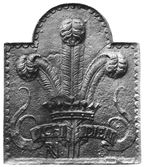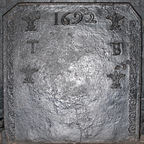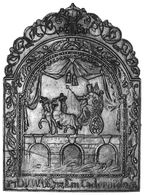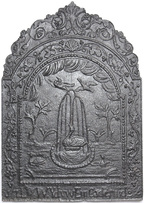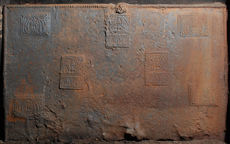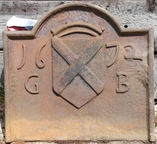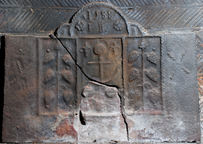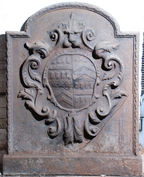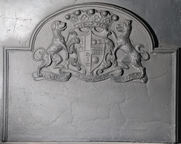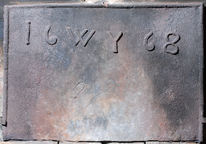-
234
Description: Arched rectangular shaped; cavetto moulded edging, scalloped top and sides; Prince of Wales’ badge of three ostrich feathers emerging through a coronet; symmetrical scroll with elaborate swirls, bearing motto; monogrammed initials at bottom, left of centre.
Notes: The scalloped edging and RN monogram have been noted on other firebacks, suggesting a common pattern maker. Formerly from Burwash, Sussex. Copies of this fireback were advertised in the Wayte & Cheverton (Edenbridge) catalogue in the early-20th century.
Copies of this fireback are known.
Inscription: ICH DIEN / RN
- Decoration tags:
- rectangular with round arch (shape)
- scalloped cavetto (edging)
- whole carved pattern
- heraldic
- monogram
- royal
- text
Manufactured: in the early- to mid-17th century in England.
Current location: National History Museum, St Fagans, Glamorgan, Wales.
Museum number: 20.177/1 (part of the Welsh National History Museum museum group)
- Attached to series:
- RN series
- Prince of Wales firebacks
-
237
Description: Canted rectangle; twisted rope edging (top and sides); repeated scroll strip stamp along each side; date, top centre, between two fleurs de lys; initial below each fleur, with a fleur below each initial.
Notes: A damaged variant (see Fireback no. 235), probably with six fleurs, no initials, dated 1694, is also known. Formerly at Great House, Llanllowell, Monmouthshire.
Inscription: 1692 / T B
- Decoration tags:
- rectangular with canted top corners (shape)
- rope (edging)
- simple stamps
- carved stamps
- individual letters
- individual numbers
- text
Manufactured: in 1692 possibly in the South Wales area of Wales.
Current location: St Fagans Castle, St Fagans, Glamorgan, Wales.
Museum number: 42.82 (part of the Welsh National History Museum museum group)
- Attached to series:
- St Fagans series
-
238
Description: Arched rectangular shaped central panel with bead-and-pellet edging on a wide fillet; crowned figure, holding a sceptre in his right hand, sitting in a chariot drawn to the left by two, caparisoned horses with ostrich feather head-dresses; the whole upon a three-arched bridge with keystones and a string course, waves beneath; above, swagged drapery with two tassels hanging from the centre; arched rectangular shaped border with fillet edging, symmetrical, descending oak leaf and acorn branches, with a looped 'W' in each shoulder; inscription at base; on top, symmetrical scrolled plant tendrils and berries. A single central vertical plankline.
Notes: One of a series produced in the same year. All incorporate the looped 'W' motif which may be intended to identify the pattern maker. The design is derived from a personification of Europe, one of a set of playing cards entitled Jeu de la Géographie, designed by Stefano della Bella for Louis XIV. The inscription translates as 'God is our strength'.
Copies of this fireback are known.
Inscription: 17 DVW Ydyw Ein Cadernid 24
- Decoration tags:
- 'Dutch' (shape)
- fillet (edging)
- whole carved pattern
- planklines
- pictorial
- allegorical
- text
- animals
- humans
- objects
Manufactured: in 1724 in England.
Current location: Tredegar House, Pencarn Way, Duffryn, Newport, Gwent, Wales.
Museum number: F81.233 (part of the Welsh National History Museum museum group)
- Attached to series:
- 1724 series
- Welsh inscription series
- British 'Dutch' style firebacks
-
240
Description: Arched rectangular shaped central panel with bead-and-pellet edging on a wide fillet; ground with birds, and trees behind; in the centre a circular fountain rim with a swan on a plinth surrounded by water, with jets of water rising from the swan’s mouth and descending on either side; above, a heron and a goose fly to the left; under the arch, swags of drapery; arched rectangular shaped border with fillet edging, symmetrical floral fronds descending from a scallop shell, top centre, with a looed 'W' in each shoulder; inscription at base between date; on top, symmetrical scrolled plant tendrils. A single central vertical plankline.
Notes: One of a group of firebacks, all of the same date, some of which have the same Welsh inscription which translates as 'God is our strength'. All incorporate the looped 'W' motif which may be intended to identify the pattern maker. The design is adapted from an illustration of fountain no. XXXIX, 'Les Cannes et le Petit Barbet' in Labyrinthe de Versailles by Sébastien le Clerc (1677); the flying heron and duck are copied from illustrations by Francis Barlow (c1626-1704) or from engravings of his work by Wenceslaus Hollar (1607-77).
Copies of this fireback are known.
Inscription: 17 DVW Ydyw Ein Cadernid 24
- Decoration tags:
- 'Dutch' (shape)
- fillet (edging)
- whole carved pattern
- planklines
- pictorial
- architectural
- text
- animals
- objects
Manufactured: in 1724 in England.
Current location: Newton House, Dinefwr, Llandeilo, Carmarthenshire, Wales.
Museum number: F83.116 (part of the Welsh National History Museum museum group)
Citation: Lloyd, N., 1925, 'Domestic Ironwork I', Architectural Review, 58, pp. 58-67.
- Attached to series:
- 1724 series
- Welsh inscription series
- British 'Dutch' style firebacks
-
241
Description: Rectangular; twisted rope edging (top and sides); irregular arrangement of two rectangular pastry stamps, each with a fleur de lys within fern leaves, and one with three additional fern leaves below; the smaller stamps form the four corners, with the larger stamp, three times, in a triangular pattern between.
Notes: Various excrescences on the plate were probably the result of careless pouring of the metal during casting.
- Decoration tags:
- rectangular (shape)
- rope (edging)
- simple stamps
- objects
Manufactured: in the mid- to late-16th century possibly at Pounsley Furnace, Framfield in the Weald area of England.
Current location: in private hands Kensington and Chelsea, London, England.
- Attached to series:
- Pounsley series
- Food mould stamp firebacks
-
242
Description: Arched rectangular shaped; astragal edging; shield bearing a saltire, beneath a baron’s coronet; date and initials split by shield.
Notes: The shield, coronet and initials may be those of George Nevill, 12th Baron Bergavenny (1665-95); the Neville arms has a rose in the centre but if the shield were a painted carving, the rose may have been painted and not carved.
Copies of this fireback are known.
Inscription: 16 72 / G B
Arms: George Nevill, 12th baron Bergavenny
- Decoration tags:
- rectangular with round arch (shape)
- carved stamps
- individual letters
- individual numbers
- text
Manufactured: in 1672 possibly in the Weald area of England.
Current location: Fulham, London, England.
- Attached to series:
- Bergavenny firebacks
- Personal armorial firebacks
-
247
Description: A modified recasting of a variant of the ‘Armada’ fireback, with initials changed to IK, a single anchor panel, and the addition of a plain base and borders, the latter each with a twisted rope saltire, upper middle.
Notes: It is likely that an original four-panel fireback has been used to recast a copy with additional side and base panels; the saltires may have apotropaic significance. A second fireback at the house cast in the 19th century is identical but for being 1% smaller all round, and has a full-width extension on top bearing four symmetrical rope saltires, the outer two larger than the inner two. The first example was used to make the second.
Inscription: 1588 / IK
- Decoration tags:
- rectangular with round arch (shape)
- simulated rope (edging)
- simple stamps
- carved pattern panels
- composite
- extension panels
- apotropaic
- text
- plants
- objects
Manufactured: in the 17th century in the Weald area of England.
Current location: Chawton House, Chawton, Hampshire, England.
- Attached to series:
- Armada series
-
34
Description: Arched rectangular shape; astragal and fillet edging (top and sides) with overlapping leaf pattern; floral cartouche with lion’s face at top, enclosing a shield bearing the arms of May (Gules, a fess between eight billets Or) quartering Broadnax (Or, two chevrons gules, on a chief of the last three cinquefoils Argent); at base a plain cuboid plinth.
Notes: Thomas Broadnax (1701-81), son of William Broadnax of Godmersham, Kent, and Anne May, heiress of Christopher May, inherited the estate of his cousin, Sir Thomas May, adopting his surname in 1727. He later changed his name to Knight on inheriting the estate of that family at Chawton in 1738.
Arms: May quartering Broadnax
- Decoration tags:
- rectangular with round arch (shape)
- astragal & fillet (edging)
- carved pattern panels
- armorial
Manufactured: in the early-18th century possibly in the Weald area of England.
Current location: Chawton House, Chawton, Hampshire, England.
- Attached to series:
- Personal armorial firebacks
-
250
Description: Arched rectangular shape; astragal and fillet edging; shield, motto, earl’s coronet and supporters (a talbot erm. and a wolf or, ducally crowned gu.) of Stanhope impaling Pitt: quarterly (1st & 4th) erm. (2nd & 3rd) gu. (Stanhope); sa., a fess chequy az. and ar. between three bezants (Pitt); motto: A DEO ET REGE.
Notes: James Stanhope was created 1st Earl in 1718; he had married Lucy Pitt in 1714. The Stanhope seat was Chevening, near Sevenoaks.
Inscription: A DEO ET REGE
Arms: Stanhope impaling Pitt; James, 1st Earl Stanhope
- Decoration tags:
- rectangular with round arch (shape)
- astragal & fillet (edging)
- carved pattern panels
- armorial
- text
Manufactured: in the early-18th century in England.
Current location: Chevening Park, Chevening, Kent, England.
- Attached to series:
- Personal armorial firebacks
- Stanhope series
-
255
Description: Rectangular; twisted rope edging (top and sides); along upper half of plate, date split with initials in between.
Notes: The initials are likely of William Yalden (d.1674), an ironmaster who was active in north-west Sussex and south-west Surrey where this and other similar firebacks have been noted.
Inscription: 16 WY 68
- Decoration tags:
- rectangular (shape)
- rope (edging)
- individual letters
- individual numbers
- text
Manufactured: in 1668 in the Weald area of England.
Current location: Ramster, Chiddingfold, Surrey, England.
- Attached to series:
- William Yalden series
